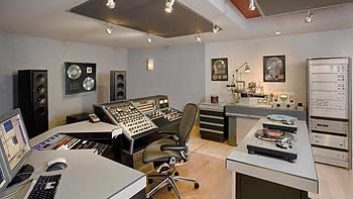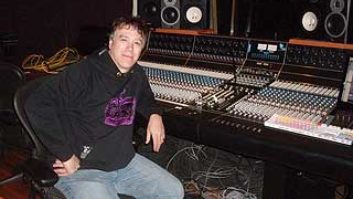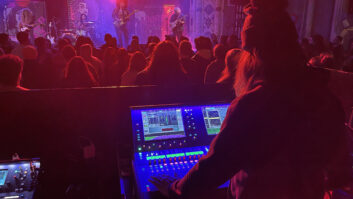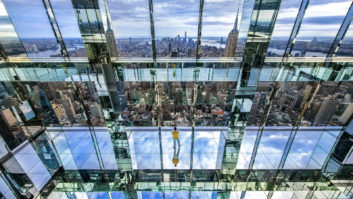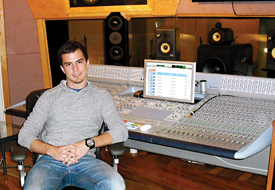
Stadiumred owner Claude Zdanow in Studio One
You know that thing they say about history? It’s something about forgetting it and then repeating it. If New York City’s next generation of studio operators is any indication, history has been studiously observed and its repetition just may be avoided. Instead, updated business models are arriving.
One Manhattan dweller intent on leading the charge into the future is Claude Zdanow, who two years ago took over Harlem’s Harmolodic space on 125th and Park (formerly owned by Ornette Coleman), renovated it and renamed it Stadiumred. An entrepreneurial spirit, to say the least, Zdanow learned in his teens that it is possible to make money with a small recording studio — he founded RockIT Studios in his parents’ Long Island basement and managed to attract major-label projects. Short stints in college and touring as a bass player convinced him that his heart lay not in academia or on the road, but in tracking, mixing and managing.
Now at the tender age of 20, Zdanow is making sure that Stadiumred has what he believes current world-class New York City facilities need to survive and thrive: ground-up flexibility, from both a technical and managerial perspective. “Initially with being a young entrepreneur, there’s a backlash — some people in the industry don’t take you seriously,” he says. “But I saw myself as being 100 percent with the technology of the times, and I’m not afraid to do things differently. I started the studio with the platform of starting strong relationships with people, being diverse and making no-B.S. decisions.”
The core of Zdanow’s philosophy can be seen in his 32-fader Digidesign ICON D-Control ES with 7.1 capability. “After microphones, in our main room and our other three rooms it’s all in the box — everything digital is so good, there’s no reason not to embrace that,” Zdanow says. “People are surprised when they come in and see an ICON, but it has multiple advantages. From a hardware standpoint, the analog boards have a lot of upkeep and maintenance, and you’re getting 64 channels of the same sound. We went with a lot of preamps that compensate for not having an SSL.
“With the ICON, the biggest thing is its integration with Pro Tools. Pro Tools is the Number One DAW in my eyes — nothing comes close to it for mixing and recording audio, and the amount of control with which you can do things with the ICON is unreal. I was building a studio to make as many people as possible happy and to do as many jobs as best as we could do them. The ICON is great for surround, and it’s also ideal for mixing 80 or 100 tracks.”
Originally designed and subsequently renovated under consultation with Alan Fierstein of Acoustilog, Stadiumred offers an extremely appealing 900-square-foot live room and spacious 400-square-foot control room. Zdanow’s confidence in the facility’s versatility has allowed him to attract a wide range of clients, including rock engineer Joseph Pedulla, hip-hop engineer Ariel Borujow and leading classical engineer Tom Lazarus, who mixed there in 5.1 for Oliver Stone’s W and in 7.1 for the San Francisco Symphony.
“The backbone of our diversity is the people we’re bringing together,” Zdanow states. “From a technological standpoint, with the ICON in the main room we’re not spending hours to recall sessions. Every piece of gear we use was put there to do the best job it can and be as flexible as possible.
“Another part of being diverse is being able to offer a variety of things to an artist that comes into a studio. There’s a division of the studio that manages artists and can do everything a label does — now it’s so easy to distribute music and function as a record label, and the recording studio gives you a platform to move forward with that. We also do video editing for commercials. So by working out of Stadiumred, you have access to a much broader range of services you wouldn’t be able to get otherwise. Another thing that’s been successful for us is giving tours [to the general public] of the facility — it’s interesting for people to come in and see where artists are working behind the scenes.”
Zdanow will be the first to admit it hasn’t all been a joyride, starting with first-hand lessons on getting burned by deadbeat clients and how to avoid them. But this wunderkind is into music recording for the long haul.
“To be a successful businessperson, you have to love what you do,” he counters. “I’ve been a musician and a songwriter my whole life. I wouldn’t be able to grow any business that I wasn’t personally involved in.”
Send New York news to
[email protected].

